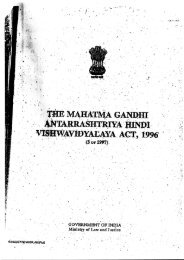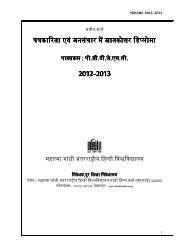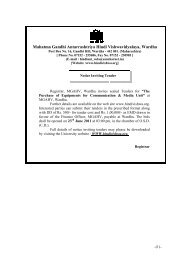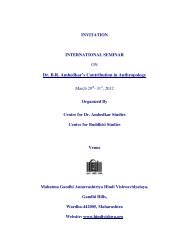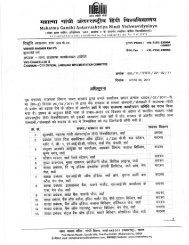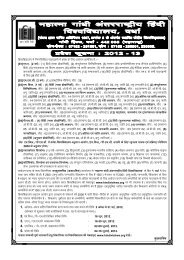fहndi - Mahatma Gandhi Antarrashtriya Hindi Vishwavidyalaya
fहndi - Mahatma Gandhi Antarrashtriya Hindi Vishwavidyalaya
fहndi - Mahatma Gandhi Antarrashtriya Hindi Vishwavidyalaya
You also want an ePaper? Increase the reach of your titles
YUMPU automatically turns print PDFs into web optimized ePapers that Google loves.
After tallying the anubhavas mentioned inthe works on rasa with those mentionedby Darwin, he avers that "in this matterour acharyas can keep pace with modernscientists". However, it is difficult to assertthat modern scientists are 'scientific' onall occasions. This is specially true ofWilliam James and McDuggal. As far asWestern Science is scientific, it is basedon materialism. According to Gulabrai, thebasis of Indian Shastras is the theory ofsachchidanand. He has clearly stated itseveral times that the indivisibility of rasacan be proved only on the assumption ofthe indivisibility of the anand-swaroop atma(atman, or soul, whose nature is bliss).Hence similar descriptions of laughing andweeping/crying do not indicate that theviewpoint of the ancient acharyascorresponds with that of Westernpsychologists.After mentioning the view of BhattLollata, Bhattanayak, Abhinava Gupta et.al. in the context of rasa-nishpatti (rasarealization),he says that the "rasa of poetryis anand which the sahridaya (thesympathetic reader) experiences after tastinghis inherent sthayibhava (stable emotion),which has been evoked by vibhavadi andwhich, after having been purified oftamoguna and rajoguna becomes luminouswith satoguna-dominated light of the self(atma-prakash)". Even if poetic rasa isblissful, the student's effort to reach itthrough the author's explanation is boundto shatter his/her indivisible soul intopieces. After this the author mentions theconcept of 'type'. It is difficult to ascertainwhere in the Shastras Babuji (Gulabrai)discovered this concept. If Sanskrit acharyashad used any term for this concept, Babujimade no mention of it.While explaining sadharnikarana(generalization) he had admitted that thereis a vast difference between present ideasand the earlier ones. Earlier the protagonistused to be a king or chieftain of a highcaste, but now a farmer like Hori couldbe protagonist of a novel. Babuji states :"In earlier times the hero used to be wellknownbecause it was easier for thesahridyays to identify with him. Now thementality of people has somewhat changed.Aristocracy no longer enjoys that respect.Hence it is easier for readers to identifywith Hori." This means that theindivisibility of the soul was experiencedearlier in the sagas of aristocratic familiesbut now it is experienced in the storiesof the exploitation of farmers. In both thesituations there is no change in theindivisibility of the soul. Sadharnikaranais such a mantra by which one attainsuniversal love whether one worships theexploiter or the exploited. Babuji says,"Shringara, which takes the form of sensualpleasure in worldly life, is purified in poetryand reaches the level of atmanand (blissof the soul). The attitude of the studentof literature is tilted towards satva-guna".Thus the poets are permitted to depictsensual pleasure in literature. With the helpof chhanda (metre) and alankara (figuresof speech) it will automatically get purifiedand reach the level of atmanand. This willnot lead only the poet to mukti8 :: April-June 2013fgndi •



